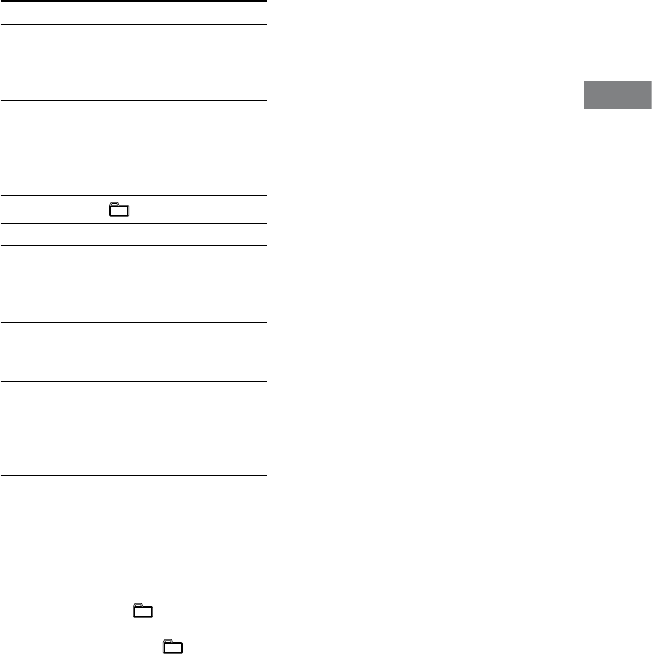
CMT-BX3R.GB.3-095-505-11(1)
17
GB
Basic Operations
Other operation
To Press
Pause playback (or USB on
the unit)
. To resume
play, press the button
again.
Stop playback
. To resume play,
press (or USB
on the unit)
*.
To cancel resume play,
press
again.
Select a folder
+/
.
Select a le /
.
Find a point in
a le
Hold down /
during playback,
and release the button
at the desired point.
Select Repeat
Play
REPEAT
repeatedly
until “REP” or “REP1”
appears.
Remove the
USB device
Hold down
on
the unit in stop mode
until “NO DEVICE”
appears, then remove
the USB device.
* When playing a VBR MP3 le, the system
may resume playback from a dierent point.
To change the play mode
Press PLAY MODE
repeatedly while
the USB device is stopped. You can
select normal play (“ ” for all les in
the folder on the digital music player),
shue play (“SHUF” or “ SHUF”), or
program play (“PGM”).
Notes on the USB device
You cannot change the play mode during
playback.
Some time may be needed to start playback
when:
the folder structure is complex.
the memory capacity is excessive.
When the USB device is inserted, the system
reads all the les on the USB device. If there
are many folders or les on the USB device,
it may take a long time to nish reading the
USB device.
Do not connect the system and the USB
device through an USB hub.
With some connected USB devices, aer an
operation is performed, there may be a delay
before it is performed by this system.
is system does not necessarily support all
the functions provided in a connected USB
device.
Files recorded by this system are played back
in the order of folder creation. Files recorded
by a device other than this system such as
a computer may not be played back in the
order in which they were recorded.
e playback order for the system may dier
from the playback order of the connected
USB device.
Always hold down
and make sure that
“NO DEVICE” appears before removing the
USB device. Removing the USB device while
“NO DEVICE” is not displayed may corrupt
the data on it or damage the USB device
itself.
Do not save other types of les or
unnecessary folders on an USB device that
has MP3 les.
Folders that have no MP3 les are skipped.
e system can only play MP3 les that have
a le extension of “.MP3”.
If there are les on the USB device that have
the “.MP3” le extension, but that are not
MP3 les, the unit may produce noise or may
malfunction.
e maximum number of MP3 les and
folders that can be contained on a single USB
device is 999 (including the “ROOT” and
“MUSIC” folders).
e maximum number of MP3 les and
folders may vary depending on the le and
folder structure.
Compatibility with all MP3 encoding/writing
sowares, recording devices, and recording
media cannot be guaranteed. Incompatible
USB device may produce noise or interrupted
audio or may not play at all.


















